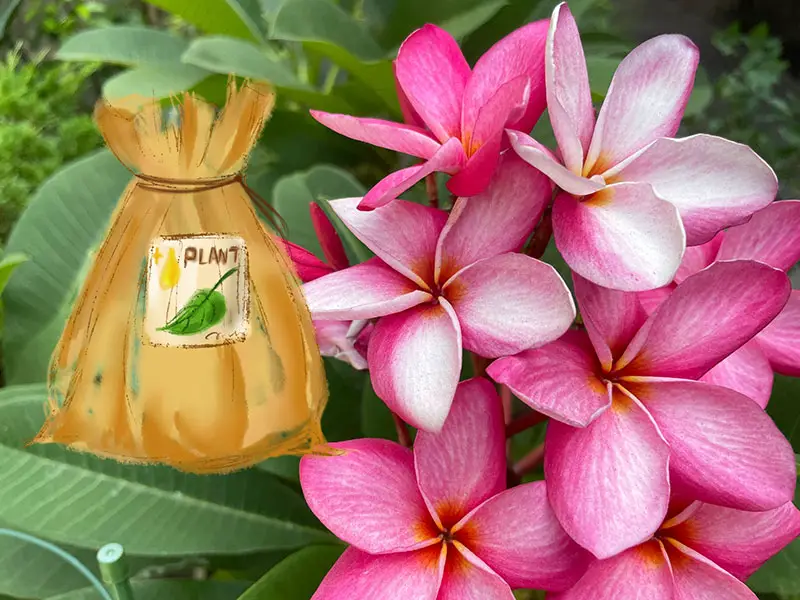Plumeria, also known as Frangipani, is an exotic flower native to tropical regions. It has become a popular ornamental plant in many parts of the world due to its fragrant and colorful blooms. While these flowers are relatively easy to care for, proper fertilization is essential for optimum growth and health.
Plumeria requires nutrients such as nitrogen, phosphorus, potassium, magnesium, and trace minerals on a regular basis for healthy development. Fertilizers can be organic or synthetic; each type offers different advantages depending on individual needs.
1. Organic Fertilizers
Organic fertilizers are a popular choice for plumeria growers because they provide an effective and natural way to nourish the plant. They contain essential nutrients such as nitrogen, phosphorus, and potassium that help promote healthy growth and vibrant blooms. Organic fertilizers also help create beneficial soil conditions by increasing the fertility of the soil over time.
Manure is one type of organic fertilizer that can be used on plumerias. It contains high levels of nitrogen which helps plants maintain their vigorous green foliage while promoting strong root development. Also, manure releases its nutrients slowly into the soil so it provides a consistent source of nutrition throughout the growing season without causing rapid or excessive growth in tender shoots.
By supplementing with organic fertilizers like compost and manure, plumeria owners can achieve long-term success in cultivating beautiful trees with abundant blooms year after year. As these types of fertilizers break down within the soil they not only contribute key macronutrients but also improve drainage properties while adding valuable organic matter to support further growth.
2. Chemical Fertilizers
Chemical fertilizers are a popular option for many gardeners due to their convenience and cost-effectiveness. According to the National Gardening Association, over 50% of the home, gardeners use chemical fertilizers in some capacity.
Chemical fertilizers contain nitrogen, phosphorus, potassium, and other essential minerals that can provide quick nutrition to plants such as plumeria. However, caution should be taken when using them; too much fertilizer or an incorrect application rate may damage roots or even kill the plant entirely. It is important to read instructions carefully before applying any chemical fertilizer product and follow all safety guidelines.
Additionally, it should be noted that although most chemical fertilizers will provide immediate nutrition to plants, they do not last long in the soil and must be reapplied regularly. This means more frequent applications throughout the growing season since there will likely be nutrient depletion by the time flowers bloom.
When used correctly, however, chemical fertilizers can help ensure the healthy growth of plumeria blooms with minimal effort from the gardener. By understanding the proper application rate needed per plant size and type along with the necessary frequency of application based on climate conditions, gardeners can achieve excellent results while ensuring maximum safety and care for plumeria shrubs.
With this knowledge in hand, transitioning into slow-release fertilizers becomes a viable option for those looking for an alternative way to maintain healthy plumeria blooms without needing regular maintenance or increased labor costs associated with chemical products.
3. Slow-Release Fertilizers
Slow-release fertilizers are an ideal choice for plumeria owners. These products provide a continuous release of essential nutrients over the course of several months, allowing plants to receive adequate nutrition without frequent applications. Slow-release formulations also help reduce plant stress and minimize leaching into surrounding soils.
There are three primary types of slow-release fertilizers: polymer-coated, sulfur-coated, and water-soluble sources.
**Polymer coated** fertilizers contain fertilizer granules that are covered in a thin layer of plastic resin or wax. As this coating slowly breaks down with exposure to rain and irrigation, it gradually releases its contents into the soil.
**Sulfur coated** products use elemental sulfur as their coating material rather than plastic resin or wax; however, they function similarly by breaking down slowly with repeated watering and releasing the contained nutrients in small doses over time.
Finally, **water soluble** formulas require mixing with water before being applied to the soil around plumeria plants. When watered thoroughly, these sources will break down quickly and be absorbed directly into roots via osmosis.
When selecting a slow-release fertilizer for plumeria plants, look for one specifically designed for acid-loving varieties such as those found in tropical climates like Hawaii or Florida where most plumerias originate from. Additionally, make sure to follow any instructions provided on the packaging regarding application rates and frequency to ensure optimal growth while minimizing the risk of nutrient burn due to excessive amounts of nitrogen or other minerals present in certain blends.
With proper selection and usage, slow-release fertilizers can help keep your plumeria healthy throughout the season without requiring frequent applications.
4. Liquid Fertilizers
Although slow-release fertilizers are a great choice for plumeria owners, some prefer to use liquid fertilizers. Liquid fertilizer is typically more concentrated and can provide nutrients quickly. It is also easy to use as it requires less mixing than granular or pelletized products.
Liquid fertilizer should be used with caution, however, since the salts found in these types of products may burn foliage if applied too heavily. To avoid damaging plants, follow the instructions on the label carefully when using any type of liquid fertilizer. Additionally, water thoroughly after application to help wash off excessive salts that could accumulate at the soil surface over time.
Overall, liquid fertilizers can be beneficial for those looking for fast results from their gardening efforts; however, they must be monitored closely so that plants do not suffer from an excess of salts and other chemicals in the product.
With careful use and monitoring, liquid fertilizers can supplement a good garden care program for plumeria enthusiasts who choose them as their preferred option.
5. Potassium-Rich Fertilizers
Plumeria plants are heavy feeders and require fertilization for optimal growth, flowering, and health. Potassium-rich fertilizers can provide a balanced source of nutrition to promote healthy foliage and abundant blooms for plumeria:
1. **Potassium Sulfate** – often referred to as sulfate of potash, this fertilizer provides 50% potassium by weight with minimal nitrogen or phosphorus content. It is used to correct deficiencies in soils that have low levels of available potassium and sulfur.
2. **Foliar Fertilizer** – specially formulated liquids containing high concentrations of potassium, as well as other trace elements needed for plant growth, may be applied directly to the leaves in order to ensure immediate availability of nutrients within the plant tissues.
3. **Organic Potassium Sources** – composted manures such as chicken manure contain naturally occurring compounds including organic forms of phosphate, nitrate, calcium, magnesium, and potassium that can benefit soil fertility and nutrient uptake by plants over time when incorporated into garden beds prior to planting new specimens.
4. **Natural Rock Dusts** – natural mineral deposits commonly called “rock dust” also contain numerous essential minerals including micronutrients like iron, zinc, and copper along with macronutrients such as calcium and phosphorus that add valuable components to soils deficient in those particular elements which aid in overall plant health from root system development through leaf production.
The balance between macronutrients (Nitrogen-Phosphorus-Potassium) is critical for ensuring strong root systems capable of supporting long-term flowering performance; an appropriate NPK ratio must be established before incorporating any additional supplements into a given landscape project or containerized specimen growing environment.
6. NPK Fertilizers
As a gardener, you know that the right fertilizer for your plumeria can make all the difference in its growth and development. Giving it the nutrition it needs is like providing vitamins to your body – each type has a particular purpose when added to the soil.
When shopping around for fertilizers, NPK stands out as an essential combination of nourishment for healthy plants. NPK stands for nitrogen (N), phosphorus (P), and potassium (K). These three elements work together to provide a balanced diet specifically designed to give plants what they need at different stages of their life cycle.
Nitrogen helps with foliage production; Phosphorus assists with root and fruit growth; Potassium benefits overall health by helping plants defend against disease. When selecting an NPK fertilizer, consider one that contains slow-release components so you don’t have to add more than once or twice through the growing season.
This will also help keep any extra nutrients from leeching away into groundwater sources or nearby streams. With just the right amount of NPK fertilizer applied regularly, you’ll be on your way to creating lush blooms among strong stems and branches on your beautiful plumeria tree.
7. Specialty Fertilizers
Fertilizers specially designed for plumeria are considered essential to ensure healthy growth and blooming. These specialty fertilizers often contain macro-nutrients, such as nitrogen (N), phosphorus (P), and potassium (K), as well as trace elements that provide supplemental nutrition for plants.
The most common forms of specialty plumeria fertilizer include:
* Liquid Fertilizer: This type of fertilizer is made from a concentrated solution that can be diluted with water and applied directly to the soil or sprayed onto leaves in small amounts. It is easy to use and provides fast absorption by both roots and foliage.
* Powdered Fertilizer: A dry form of fertilizer composed of nutrient-rich granules which dissolve in water when mixed with other ingredients, providing slow-release nutrients over time.
* Slow Release Fertilizer: Usually comes pre-packaged in pellets or capsules which slowly break down into nutrient components that become available to plant roots over an extended period of time before needing replenishment.
These specialty fertilizers offer balanced nutrition that ensures optimal health and growth, while also helping promote strong blooms on your plumeria plants throughout the growing season.
How Often To Fertilize Plumeria
Fertilizing plumeria is like giving a birthday present to a beloved friend. It’s not something you should do regularly, but it does need to be done occasionally for the best results.
Special fertilizers are available that can help provide your plants with all the nutrients they need for healthy blooms and growth. The most important nutrient needed by plumeria is nitrogen, which helps promote leaf production, create flowers, and aid in overall plant health.
A balanced fertilizer with an N-P-K rating of 8-8-8 or 10-10-10 is recommended as it contains both phosphorus and potassium in addition to nitrogen. Organic fertilizers such as fish emulsion or kelp meal may also be used and will release their nutrients slowly over time without burning the roots of your plants.
In order to get optimal performance from your plumeria, regular feeding is essential; however, this doesn’t mean fertilizing every day or even every week. Fertilize during the growing season (usually early spring through late summer) at intervals of 4–6 weeks using either granular or liquid forms of fertilizer according to package directions.
Make sure to avoid overfertilization as too much nitrogen can lead to fewer flowers and weak stems on your plumerias.
Final Thoughts
Plumeria plants are known for their bright, vibrant colors and sweet scent. With the correct fertilizer regime, plumeria can thrive in many different environments.
The eight best fertilizers for plumeria include organic, chemical, slow-release, liquid, potassium-rich, NPK (Nitrogen/Phosphorus/Potassium), specialty fertilizers, and frequent applications of nutrients to maintain optimal health. Fertilizing regularly will ensure your plumeria blooms with its characteristic beauty and striking color all season long.
When it comes to caring for a plumeria plant, getting the right balance between water, sunlight, and fertilizer is key to a thriving specimen. As they say “a little goes a long way” when feeding your plumeria; too much nutrient at once can be detrimental so use caution when applying any type of fertilizer.
Regularly monitor soil moisture levels before adding more fertilizer or irrigation as over-fertilization may lead to leaf burn or root damage. Proper care will help you get the most out of your beautiful blooms.

